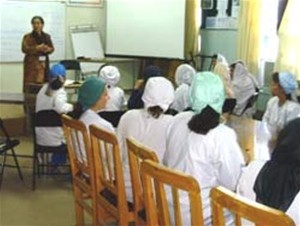
The newly formed Afghan Midwives Association meets at Kabul's Rabia Balkhi Hospital.
Judith Schiffbauer, REACH
One woman spearheads the effort to improve midwife training
"All of us need the support that an organization like this can provide," said one midwife. "Until now, we’ve had to work alone."
4 OCTOBER 2005 | KABUL
"All of us need the support that an organization like this can provide," said one midwife. "Until now, we've had to work alone."
Afghanistan's maternal and child mortality rate is among the highest in the world, but the Taliban would not allow the training of new nurse-midwives. When the regime was ousted, only 537 skilled, trained nurse-midwives — kabilaha — remained in the country. USAID is working to triple that number and, at the same time, establish trained midwifery as a profession worthy of support and respect.
Rebuilding and revitalizing Afghanistan's midwifery programs after years of neglect requires unflagging energy and determination. Pashtoon Azfar has just that. As chairperson of the newly formed Afghan Midwives Association (AMA), she is spearheading USAID's effort. Pashtoon is working with the Institutes of Health Science in Kabul and the provinces to rehabilitate their schools of midwifery and implement standardized midwifery curricula. She also conducts clinical training courses for the staff of local, USAID-funded organizations who, in turn, pass their expertise onto others.
At a recent AMA meeting chaired by Pastoon at Rabia Balkhi Hospital in Kabul, 25 nurse-midwives, all currently practicing in Kabul clinics, health centers and hospitals, gathered to discuss ways to increase their numbers.
"Nurse-midwives in every Afghan province must learn of and be represented in the Association," said Pashtoon. "The greater our number, the greater good we can do for women, mothers, and families in this country."
Razia, attending an AMA meeting for the first time, echoed Pashtoon's view. "All of us need the support an organization like this can provide. Until now, we've had to work alone."
Within a cultural context that has long excluded women from educational and professional opportunities, under Pashtoon's leadership, and with the support of the Ministry of Public Health and USAID, the Afghan Midwives Association is expanding its membership and working to qualify for membership in the International Association of Midwives.
"Afghanistan faces many problems," said Pashtoon. "The path will not be easy, but if we travel it together, giving strength to one another, we can do so much more to help solve them."







Comment
Make a general inquiry or suggest an improvement.